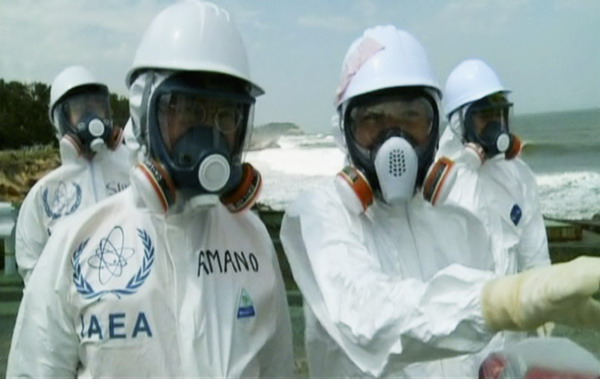Asia
Waters off Fukushima affected by radiation
Updated: 2011-07-31 19:20
(Xinhua)
|
 Director General of the International Atomic Energy Agency Yukiya Amano (L) inspects the site of Tokyo Electric Power Company (TEPCO)'s Fukushima Daiichi nuclear power plant in Fukushima Prefecture, in this still image taken from video July 25, 2011. [Photo/Agencies]
|
Initial tests of samples collected from these areas show that radioactive cesium-137 and -134, as well as strontium-90 can be found in all water samples, the statement said.
The statement said that under normal conditions, cesium-134 cannot be detected in sea waters, and that the maximum amounts of cesium-137 and strontium-90 detected in the samples are 300 times and 10 times, respectively, of the amounts of natural background radiation in China's territorial waters, the statement said.
However, the amount of radioactive materials in air samples tested as normal.
The statement said that the administration has sent professional personnel to these waters to monitor the impact of the crisis at the Fukushima Daiichi nuclear power plant, as well as to China's territorial waters.
The 18-day voyage, which ended on July 4, monitored waters of 25.2 square kilometers, and the monitoring team collected air, water and biological samples from the spot areas, the statement said.
The administration will continue to publish results of further testing and evaluations of the samples, the statement said.
The Fukushima Daiichi Nuclear Power Plant in Japan was crippled by a 9.0-magnitude earthquake and ensuing tsunami on March 11.

Specials

Carrier set for maiden voyage
China is refitting an obsolete aircraft carrier bought from Ukraine for research and training purposes.
 Photo
Photo  Video
Video

Pulling heart strings
The 5,000-year-old guqin holds a special place for both european and Chinese music lovers

Fit to a tea
Sixth-generation member of tea family brews up new ideas to modernize a time-honored business